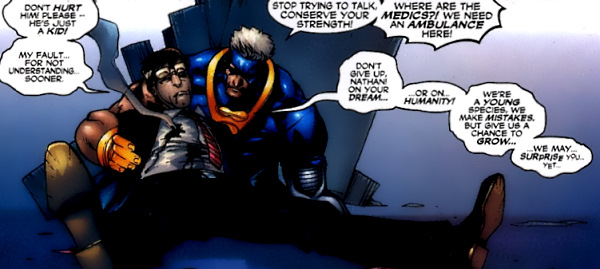BIOGRAPHY
Born in Boston, Massachusetts, Robert Kelly’s early life was relatively benign compared to his later activities when he stepped on the world stage. After marrying a woman named Sharon and serving in the military for a number of years, Robert had political aspirations and was elected as a US Senator shortly after. He had a rather conservative view on his country and was alarmed by the various civil rights movements, none of which boded well for a man like him.
 When the hero Blue Marvel was revealed to be the African American man Adam Brashear, Senator Kelly was alarmed at the prospect of such a powerful man being a part of a minority group. The President at the time was considering using Brashear as a way to heal the divisions within the country, but Kelly consulted with the President and advised him otherwise. Ultimately on Kelly’s advice, the President asked Brashear to step away from the limelight, removing one of the most powerful up-and-coming African American superheroes from the political landscape. [Adam: Legend of Blue Marvel #1]
When the hero Blue Marvel was revealed to be the African American man Adam Brashear, Senator Kelly was alarmed at the prospect of such a powerful man being a part of a minority group. The President at the time was considering using Brashear as a way to heal the divisions within the country, but Kelly consulted with the President and advised him otherwise. Ultimately on Kelly’s advice, the President asked Brashear to step away from the limelight, removing one of the most powerful up-and-coming African American superheroes from the political landscape. [Adam: Legend of Blue Marvel #1]
Senator Kelly quickly climbed the political ladder, going on to make a bid for the office of president himself. He made numerous allies across the political spectrum and, with the revelation of the existence of mutants, he finally had his cause to champion and rally his supporters around. One of his many allies was Sebastian Shaw, leader of the Hellfire Club, a society of rich and connected people who worked behind the scenes pulling political strings for their own benefit. 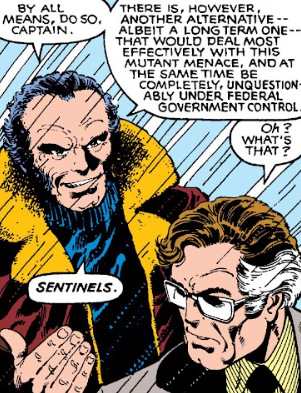 Kelly was firmly against the existence of mutants and was concerned by the rise in the activities of groups, such as the X-Men and Brotherhood. Unbeknownst to him, Shaw was also a mutant, a skilled manipulator who enjoyed playing both sides of the divide for his own gain. When the Hellfire Club hosted an anniversary event, Kelly was invited along with a lot of other influential people. The party ended up being interrupted by the X-Men, with numerous members of the Hellfire Club being injured in the ruckus. Senator Kelly was infuriated with the mutant’s audacity and the fact the authorities were too afraid to go after them. Always looking to make a profit, Shaw informed Kelly that he had a side business dealing in the mutant-hunting Sentinels. [X-Men (1st series) #133-135]
Kelly was firmly against the existence of mutants and was concerned by the rise in the activities of groups, such as the X-Men and Brotherhood. Unbeknownst to him, Shaw was also a mutant, a skilled manipulator who enjoyed playing both sides of the divide for his own gain. When the Hellfire Club hosted an anniversary event, Kelly was invited along with a lot of other influential people. The party ended up being interrupted by the X-Men, with numerous members of the Hellfire Club being injured in the ruckus. Senator Kelly was infuriated with the mutant’s audacity and the fact the authorities were too afraid to go after them. Always looking to make a profit, Shaw informed Kelly that he had a side business dealing in the mutant-hunting Sentinels. [X-Men (1st series) #133-135]
Over the next few weeks, Senator Kelly increased his anti-mutant rhetoric and became a serious contender for the presidency. Whilst he gained a lot of supporters who were concerned with the rise in mutants, he also attracted the attention of people who wanted to silence his opinions. The 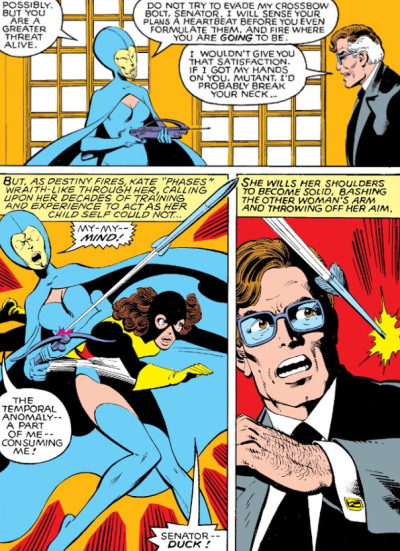 shapeshifter Mystique had formed her own Brotherhood of Mutants and the group had set their sights firmly on Kelly, hoping to put an end to the hatred he was spewing. Working with Shaw, Kelly had been drafting a series of propositions he wanted to invoke that would harshly deal with the mutant threat. One such proposal was the Mutant Registration Act, that would require all mutants to register with the government so they could be monitored. Senator Kelly met with the rest of congress to propose this law, but the hearing was violently interrupted by Mystique and her Brotherhood. The X-Men had been tipped off to Mystique’s activities by a time-travelling Kitty Pryde, and the team fought against the Brotherhood whilst Senator Kelly rushed to safety. The precognitive Destiny managed to corner him, but his life was saved by Kitty’s intervention, knocking Destiny’s shoulder just as she fired a crossbow at Kelly. [X-Men (1st series) #141-142]
shapeshifter Mystique had formed her own Brotherhood of Mutants and the group had set their sights firmly on Kelly, hoping to put an end to the hatred he was spewing. Working with Shaw, Kelly had been drafting a series of propositions he wanted to invoke that would harshly deal with the mutant threat. One such proposal was the Mutant Registration Act, that would require all mutants to register with the government so they could be monitored. Senator Kelly met with the rest of congress to propose this law, but the hearing was violently interrupted by Mystique and her Brotherhood. The X-Men had been tipped off to Mystique’s activities by a time-travelling Kitty Pryde, and the team fought against the Brotherhood whilst Senator Kelly rushed to safety. The precognitive Destiny managed to corner him, but his life was saved by Kitty’s intervention, knocking Destiny’s shoulder just as she fired a crossbow at Kelly. [X-Men (1st series) #141-142]
[Note: Had Destiny’s crossbow bolt hit true, Kelly’s death would have created the dystopian Days of Future Past timeline. For a look at the ramifications of Kelly’s death and how the time-travelling Kitty Pryde fits into the story, please click on the following link for the Days of Future Past article.]
Despite the X-Men saving his life, Senator Kelly remained firm in his resolve that something needed to be done about mutants. He was given permission to form the congressional committee of mutant affairs and became a fixture on TV whenever the subject of mutants was discussed. [Uncanny X-Men (1st series) #158]

Not giving up on his cause, Senator Kelly worked behind the scenes to propose the new Mutant Affairs Control Act, another way of monitoring and restricting rights to mutants. He started touring the country, informing the public about the act, but his hardline stance on mutants was met with a lot of protests wherever he went. Kelly became the target of another assassination attempt by a mutant, this time being saved by Beast, Angel and Iceman from the Defenders. This act of heroism still didn’t deter him from his mission; it only convinced him that mutants really were dangerous. [Uncanny X-Men (1st series) #181, Defenders (1st series) #142]
Senator Kelly’s life was to irrevocably changed when his wife Sharon was killed during a fight between the X-Men and a Sentinel. As the two drove in their car, they were hit by Rogue, who had 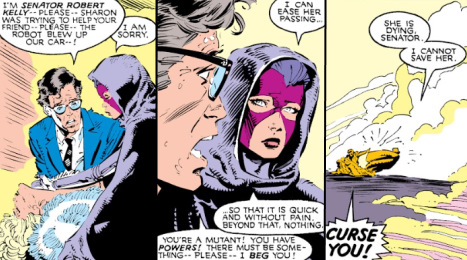 been thrown across the city by the Sentinel. Whilst Kelly was knocked unconscious, Sharon dragged him to safety and then ran back to retrieve Rogue. Sadly, the Sentinel caught up to them and blasted the car, fatally injuring Sharon in the explosion. Kelly woke to find his wife lying motionless next to him and, when he looked up, he saw the fight between the X-Men and Sentinel raging on. As Sharon lay dying in his arms, she begged for him not to let the hate take over, but it was too late. The irony was that Kelly and Shaw had been funding the Sentinels in secret for a long time. Ignoring the fact that a Sentinel had ultimately killed his wife, Kelly instructed Shaw to ramp up production on some newly designed Sentinels that were capable of healing themselves. [Uncanny X-Men (1st series) #246-247]
been thrown across the city by the Sentinel. Whilst Kelly was knocked unconscious, Sharon dragged him to safety and then ran back to retrieve Rogue. Sadly, the Sentinel caught up to them and blasted the car, fatally injuring Sharon in the explosion. Kelly woke to find his wife lying motionless next to him and, when he looked up, he saw the fight between the X-Men and Sentinel raging on. As Sharon lay dying in his arms, she begged for him not to let the hate take over, but it was too late. The irony was that Kelly and Shaw had been funding the Sentinels in secret for a long time. Ignoring the fact that a Sentinel had ultimately killed his wife, Kelly instructed Shaw to ramp up production on some newly designed Sentinels that were capable of healing themselves. [Uncanny X-Men (1st series) #246-247]
In a strange turn of events, Mystique and her Brotherhood, now calling themselves Freedom Force, ended up saving Kelly’s life when he was taken hostage. He was surprised to see her working for the government, and reluctantly accepted her help in freeing a village from the tyranny of a supervillain. [Marvel Comic Presents (1st series) #41]
 Kelly took some time out to grieve his wife but, when he stepped out of the shadows again, he was just as determined to put a stop to the mutant menace. Whenever there was an incident involving mutants, Kelly made sure he visited the scene to stir public opinion away from the X-Men and mutants. Other anti-mutant humans were also gaining traction in their own political aspirations, such as Graydon Creed, forcing Kelly to adopt a slightly different approach. He toned down his heated words and addressed the issue in a calm and level-headed manner. In a TV debate with Creed and Professor Xavier, Senator Kelly admonished Creed for trying to use Sharon’s death for his own gain. Kelly told the audience that, although time had allowed him to see things more clearly, he still believed mutants needed to be controlled, but he drew the line at murdering them. As Xavier explained his viewpoint, Kelly found himself agreeing with the man’s stance, completely unaware of Xavier’s status as a mutant. Whilst Kelly ended the TV debate in a favorable light, his ultimate goal was still the persecution of mutants. [Uncanny X-Men (1st series) #298-299]
Kelly took some time out to grieve his wife but, when he stepped out of the shadows again, he was just as determined to put a stop to the mutant menace. Whenever there was an incident involving mutants, Kelly made sure he visited the scene to stir public opinion away from the X-Men and mutants. Other anti-mutant humans were also gaining traction in their own political aspirations, such as Graydon Creed, forcing Kelly to adopt a slightly different approach. He toned down his heated words and addressed the issue in a calm and level-headed manner. In a TV debate with Creed and Professor Xavier, Senator Kelly admonished Creed for trying to use Sharon’s death for his own gain. Kelly told the audience that, although time had allowed him to see things more clearly, he still believed mutants needed to be controlled, but he drew the line at murdering them. As Xavier explained his viewpoint, Kelly found himself agreeing with the man’s stance, completely unaware of Xavier’s status as a mutant. Whilst Kelly ended the TV debate in a favorable light, his ultimate goal was still the persecution of mutants. [Uncanny X-Men (1st series) #298-299]
This was no more apparent than when he got involved in the covert government operation, Project Wideawake. Designed to curb the ever-growing mutant population, Kelly oversaw the production of Sentinels and was present when X-Factor and the Acolytes discovered it. He was nearly killed by the Acolyte Frenzy but was saved by the timely arrival of Wolfsbane. [X-Factor (1st series) #92]
Over the next few months, Kelly kept an eye on the numerous mutant factions that were popping up, especially the government-sponsored X-Factor. [X-Factor (1st series) #123, X-Men Prime]
Even though Senator Kelly did his best to ensure the integrity of Project Wideawake and the Mutant Affairs Control Act, tensions between mutants and humans escalated. When some of Kelly’s scientists working on Project Wideawake mysteriously disappeared, he stumbled on a secret movement called Operation: Zero Tolerance, which was working to undermine his work to ensure a much deadlier outcome for mutants. Kelly knew he had to warn the X-Men and 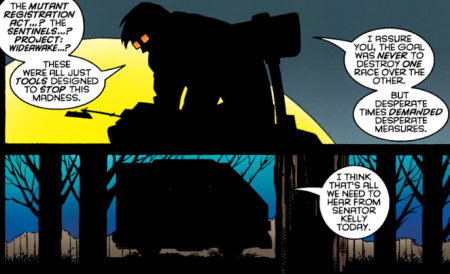 contacted them secretly so he could pass what information he knew on to them. Bastion, the mastermind behind OZT, became aware of Kelly’s plans and sent Graydon Creed to deal with the man. As Kelly met with Cyclops, Graydon detonated an explosive device, injuring both men. [Uncanny X-Men (1st series) #333, X-Men (2nd series) #46]
contacted them secretly so he could pass what information he knew on to them. Bastion, the mastermind behind OZT, became aware of Kelly’s plans and sent Graydon Creed to deal with the man. As Kelly met with Cyclops, Graydon detonated an explosive device, injuring both men. [Uncanny X-Men (1st series) #333, X-Men (2nd series) #46]
Kelly had survived yet another attempt on his life and, in the weeks that passed, Graydon himself was killed whilst Bastion quietly worked from the shadows. Kelly began to have serious misgivings about the direction the government was going in to protect the citizens of the U.S. from the mutants. As they developed more dangerous machines and upgraded Sentinels, Kelly couldn’t see a positive outcome for anyone. Eventually, after visiting his wife’s grave and airing his thoughts, Kelly decided it was time to take a stand and shut OZT down, despite the consequences that may befall him. [Uncanny X-Men (1st series) #344, Wolverine (2nd series) #116]
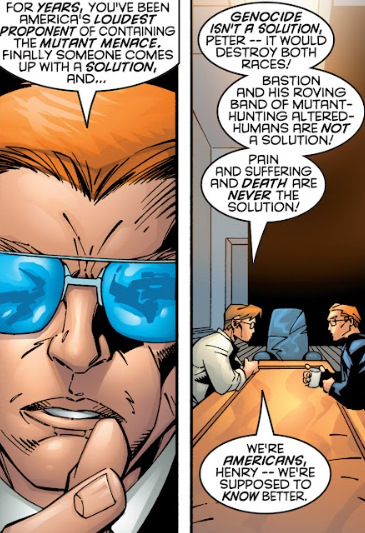 Kelly soon learned that Bastion had been using his Sentinels and the kidnapped scientists for his own agenda, turning humans into Sentinel sleeper agents. Knowing it could make or break his entire career, Kelly met with the president and spoke his mind, hoping that they would shut OZT down before it was too late. Whilst Bastion did manage to unleash his secret Prime Sentinels, Kelly was instrumental in putting a stop to his machinations from a political standpoint, whilst the X-Men took the threat on directly. [X-Men (2nd series) #68-69]
Kelly soon learned that Bastion had been using his Sentinels and the kidnapped scientists for his own agenda, turning humans into Sentinel sleeper agents. Knowing it could make or break his entire career, Kelly met with the president and spoke his mind, hoping that they would shut OZT down before it was too late. Whilst Bastion did manage to unleash his secret Prime Sentinels, Kelly was instrumental in putting a stop to his machinations from a political standpoint, whilst the X-Men took the threat on directly. [X-Men (2nd series) #68-69]
After the dust had settled and Bastion was defeated, Kelly began looking into the disappearance of Xavier, who had been kidnapped by Bastion during the chaos. After digging through the trail of files left behind by Bastion, Kelly located his prison cell in a hidden facility in the Nevada Desert. However, when he travelled there, Xavier was nowhere to be found. [X-Men (2nd series) #73]
In spite of all that had happened, Senator Kelly still saw the need to address the mutant threat and decided to make another bid for the Presidency. As he kicked off his campaign, a number of mutants and allies approached him expressing their concern, causing Kelly to waiver in his beliefs. [X-Men (2nd series) #102, 104-107]
Not everyone was so convinced by his passive outlook, as Mystique had begun assembling her Brotherhood once more to finish what she started years before. Kelly became aware of Mystique’s plans but was adamant that he wasn’t going to let fear stop him from taking a stand. Whilst giving a rally speech, he was interrupted by the arrival of Mystique and her Brotherhood, looking for blood. Despite the X-Men arriving on the scene, Kelly was once again cornered by Post, one of the Brotherhood. With his death imminent, Kelly was saved by the unlikely 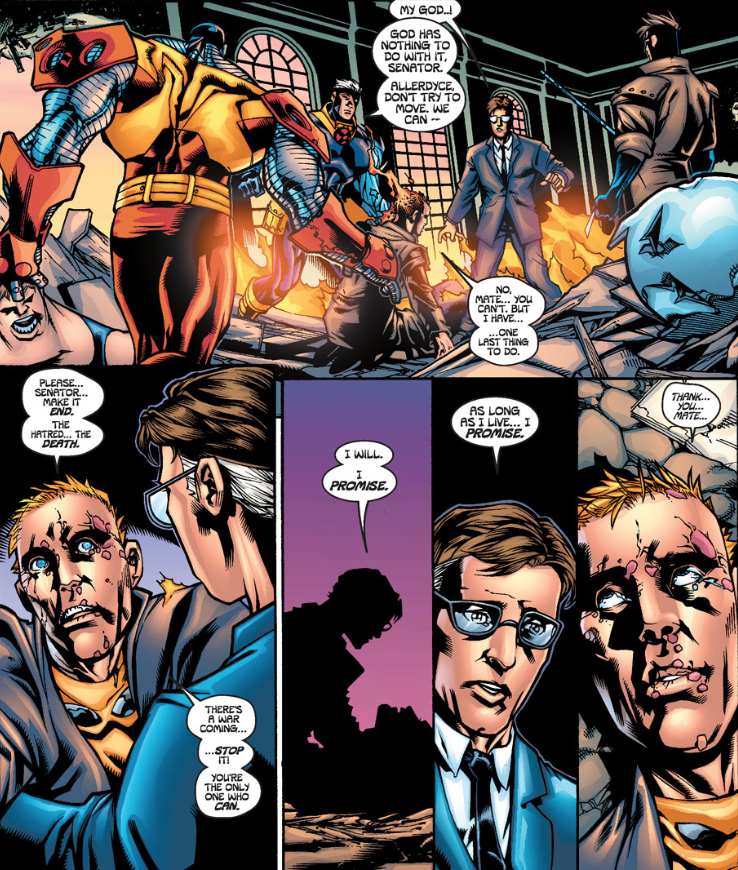 intervention of the former Brotherhood member Pyro, who was dying of the Legacy virus. Having had his own epiphany about life as he slowly died, Pyro used his last bit of energy to attack Post, saving Kelly’s life in the process. Shocked by what he just saw, Kelly held Pyro as he died and promised the man to make things better for everyone. Meeting with Cable the following day, Kelly discussed recent events and vowed to do the right thing. At his next press conference, he stood up and took back his stance on his anti-mutant views, proclaiming that together humans and mutants could work make a better future.
intervention of the former Brotherhood member Pyro, who was dying of the Legacy virus. Having had his own epiphany about life as he slowly died, Pyro used his last bit of energy to attack Post, saving Kelly’s life in the process. Shocked by what he just saw, Kelly held Pyro as he died and promised the man to make things better for everyone. Meeting with Cable the following day, Kelly discussed recent events and vowed to do the right thing. At his next press conference, he stood up and took back his stance on his anti-mutant views, proclaiming that together humans and mutants could work make a better future.
After spending years campaigning on an anti-mutant stance, Kelly’s sudden turn angered a lot of his supporters. One in particular couldn’t handle Kelly’s sudden “betrayal” and shot the man whilst he delivered one of his speeches. In the end, despite the numerous attempts on his life by mutants, it was a human who put a violent end to Robert Kelly’s life. [Dream’s End crossover]
